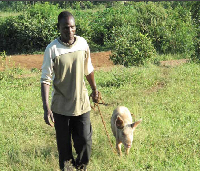



Ebola Risk Assessment in the Pig Value Chain in Uganda
Recent epidemiological work has revealed pigs as a host for Ebolavirus, according to a new report from the International Livestock Research Institute. With a rapidly expanding pig population in Uganda and many of them sharing the same habitats as the main vector, the fruit bat, the authors call for more research to assess better the disease risk posed by pig farming in the country.In Uganda, the frequency of Ebola virus disease (EVD) outbreaks is increasing, with many of the index case patients unable to account for their source of infection, report Christine Atherstone, Kristina Roesel and Delia Grace in a new report for The International Livestock Research Institute (ILRI), which is part of the CGIAR global agricultural research partnership. Recent epidemiological work has revealed swine as a host for Ebolavirus, the authors say.

Agriculture is the backbone of Uganda’s economy, providing livelihoods to 80 per cent of its citizens. The predicted four-fold population explosion in the next 40 years will place pressure on livestock production to address infections that affect production outputs in order to safeguard food security and human health.
A more thorough understanding of how Ebolavirus infection impacts the health and welfare of pigs, and hence the health and livelihoods of pig farmers, will help prioritise how limited resources can be efficiently expended to ensure human health, livelihoods, food safety and food security.
The rising demand for pork in Uganda has sparked a massive expansion of pig production in the country. Pigs are preferred to other livestock species due to their relatively rapid growth rate, large litter sizes and potential to provide financial returns over a relatively short time.
These higher pig populations, particularly those reared under tethering or free-range systems, overlap with fruit bat habitats. Where these pigs scavenge for food, they come in contact with dropped fruit, excrement, saliva, urine and faeces from suitable fruit bat hosts of Ebolavirus.
Furthermore, this intensification of pig production coupled with poor pig husbandry practices increases pig-human contact, a risk for direct transmission of Ebolavirus.
In order to strengthen the pig value chain in Uganda, further research is warranted to determine what role pigs play in Ebolavirus transmission and specific risk factors for infection in pigs and from pigs to humans.
Such foresight will help identify interventions that would minimise food instability, public health consequences, social stigma, mass public panic and negative economic impact from trade and travel restrictions associated with Ebola virus disease outbreaks.
Reference
Atherstone, C., Roesel, K. and Grace, D. 2014. Ebola risk assessment in the pig value chain in Uganda. ILRI Research Report 34. Nairobi, Kenya: International Livestock Research Institute.
August 2014






